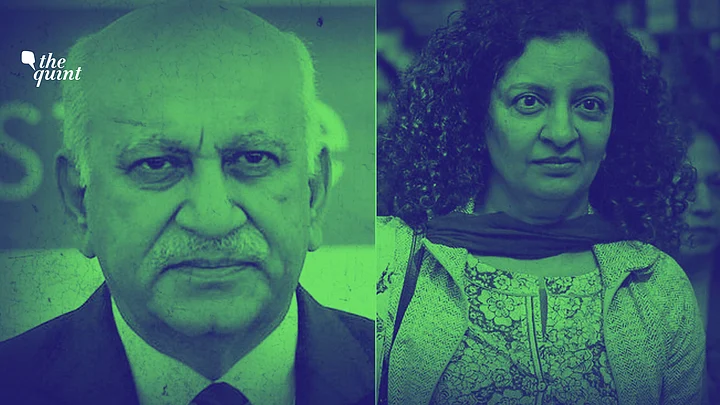Senior advocate Rebecca John, appearing for journalist Priya Ramani, began her concluding argument before a Delhi court on Saturday, 5 September, in a defamation case against Ramani slapped by former BJP minister MJ Akbar.
The court was adjourned mid-way, owing to other commitments, but John’s concluding remarks will continue at 12 noon on 8 September.
Rebecca John, amid her arguments, submitted before the court that Priya Ramani does admit to writing the contentious Vogue article, but states that the article does not pertain to Akbar alone.
“I would like to highlight at this point that the (Vogue) article deals with both Akbar and other male bosses.”Rebecca John, appearing for Priya Ramani
In a 2017 article about sexual predators in workplace, written for Vogue, Ramani had described her own ordeal of having been sexually harassed by a former boss. A year later, in the wake of the #MeToo movement, Ramani had alleged on social media that the former boss had, in fact, been Akbar.
Akbar had subsequently filed a criminal defamation case against Ramani, asserting that Ramani’s allegations were false and that it had cost him his “stellar reputation”.
Exceptions to Defamation
In her statement, John said that the offence of defamation is not an absolute offence, but a justifiable offence.
She pointed out that Ramani had pleaded “truth” as her defence, “made in good faith, in public interest, and for public good”; and went on to cite exceptions 1 and 9 interlinked with exception 3 to Section 499 of the Indian Penal Code.
- Exception 1: It is not defamation to impute anything which is true concerning any person, if it is made or published for public good.
- Exception 9: It is not defamation to make an imputation on the character of another provided that the imputation be made in good faith for the protection of the interests of the person making it, or of any other person, or for the public good.
- Exception 3: It is not defamation to express in good faith any opinion whatever respecting the conduct of any person touching any public question, and respecting his character, so far as his character appears in that conduct, and no further.
John Points Out Inconsistencies in Akbar’s Statements
Rebecca John, further, read Akbar’s statements made in the pre-summoning stage as well as during the cross-examination and asserted that there were inconsistencies in Akbar’s response to questions asked about Ramani’s story.
“Earlier he had said he doesn’t remember, later he denied those facts.”Rebecca John
Referring to allegations made by other women against Akbar, Rebecca said that they were known to Akbar as he himself had exhibited a Firstpost article that contained all those tweets.
John also said that Akbar had mentioned he doesn’t remember being seven a contempt notice by the high court, but “later on he recognised it when a certified copy was shown to him.”
John, also pointed out that Akbar, in his statements, had said that he was in consensual relationship with journalist Pallavi Gogoi – who too, accused Akbar of sexually harassing her.
Akbar had said that that she was not working under duress.
However, John pointed out before the court that there was a substantial age and power difference between Pallavi Gogoi and MJ Akbar, and she was her subordinate.
Background
Akbar has alleged that Priya Ramani had defamed him by referring to him with adjectives such as “media’s biggest predator” in the wake of the #MeToo movement in 2018 and, in the process, had harmed his reputation.
In 2018, Ramani had accused MJ Akbar of indulging in sexual misconduct around 20 years ago. Her allegations date back to the time when Akbar was a journalist. Ramani worked at The Asian Age from January to October in 1994.
According to PTI, senior advocate Geeta Luthra, appearing for Akbar, asserted that the allegations were malafide.
“When you call someone media’s biggest predator, it is per se defamatory. Calling a person with such adjectives is on the face of it defamatory. In the eyes of the people, Akbar’s reputation was harmed. The per se effect was lowering of my (Akbar) reputation in the eyes of the right-thinking members of the society.”Geeta Luthra, according to PTI
Further, Luthra reportedly said there was no due process in the allegations.
Ramani has previously told the court that she had disclosed the alleged instance of sexual harassment by Akbar at a great personal cost. She had also reportedly said that she had ‘nothing to gain’ from it, and that her move would empower women.
